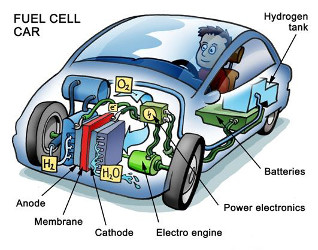Local Knowledge About Hydrogen Powered Vehicles

Fuel cell vehicles use hydrogen gas to power an electric motor. Unlike conventional vehicles which run on gasoline or diesel, fuel cell cars and trucks combine hydrogen and oxygen to produce electricity, which runs a motor. Since they’re powered entirely by electricity, fuel cell vehicles are considered electric vehicles (“EVs”)—but unlike other EVs, their range and refueling processes are comparable to conventional cars and trucks.
Converting hydrogen gas into electricity produces only water and heat as a byproduct, meaning fuel cell vehicles don’t create tailpipe pollution when they’re driven. Producing the hydrogen itself can lead to pollution, including greenhouse gas emissions, but even when the fuel comes from one of the dirtiest sources of hydrogen, natural gas, today’s early fuel cell cars and trucks can cut emissions by over 30 percent when compared with their gasoline-powered counterparts. Future renewable fuel standards are likely to make hydrogen even cleaner.
Because fuel cell vehicles are only beginning to enter the U.S. market, interested drivers should ensure they live near hydrogen refueling stations.
 Fuel cell vehicles use hydrogen gas to power an electric motor. Unlike conventional vehicles which run on gasoline or diesel, fuel cell cars and trucks combine hydrogen and oxygen to produce electricity, which runs a motor. Since they’re powered entirely by electricity, fuel cell vehicles are considered electric vehicles (“EVs”)—but unlike other EVs, their range and refueling processes are comparable to conventional cars and trucks.
Converting hydrogen gas into electricity produces only water and heat as a byproduct, meaning fuel cell vehicles don’t create tailpipe pollution when they’re driven. Producing the hydrogen itself can lead to pollution, including greenhouse gas emissions, but even when the fuel comes from one of the dirtiest sources of hydrogen, natural gas, today’s early fuel cell cars and trucks can cut emissions by over 30 percent when compared with their gasoline-powered counterparts. Future renewable fuel standards are likely to make hydrogen even cleaner.
Because fuel cell vehicles are only beginning to enter the U.S. market, interested drivers should ensure they live near hydrogen refueling stations.
Fuel cell vehicles use hydrogen gas to power an electric motor. Unlike conventional vehicles which run on gasoline or diesel, fuel cell cars and trucks combine hydrogen and oxygen to produce electricity, which runs a motor. Since they’re powered entirely by electricity, fuel cell vehicles are considered electric vehicles (“EVs”)—but unlike other EVs, their range and refueling processes are comparable to conventional cars and trucks.
Converting hydrogen gas into electricity produces only water and heat as a byproduct, meaning fuel cell vehicles don’t create tailpipe pollution when they’re driven. Producing the hydrogen itself can lead to pollution, including greenhouse gas emissions, but even when the fuel comes from one of the dirtiest sources of hydrogen, natural gas, today’s early fuel cell cars and trucks can cut emissions by over 30 percent when compared with their gasoline-powered counterparts. Future renewable fuel standards are likely to make hydrogen even cleaner.
Because fuel cell vehicles are only beginning to enter the U.S. market, interested drivers should ensure they live near hydrogen refueling stations.